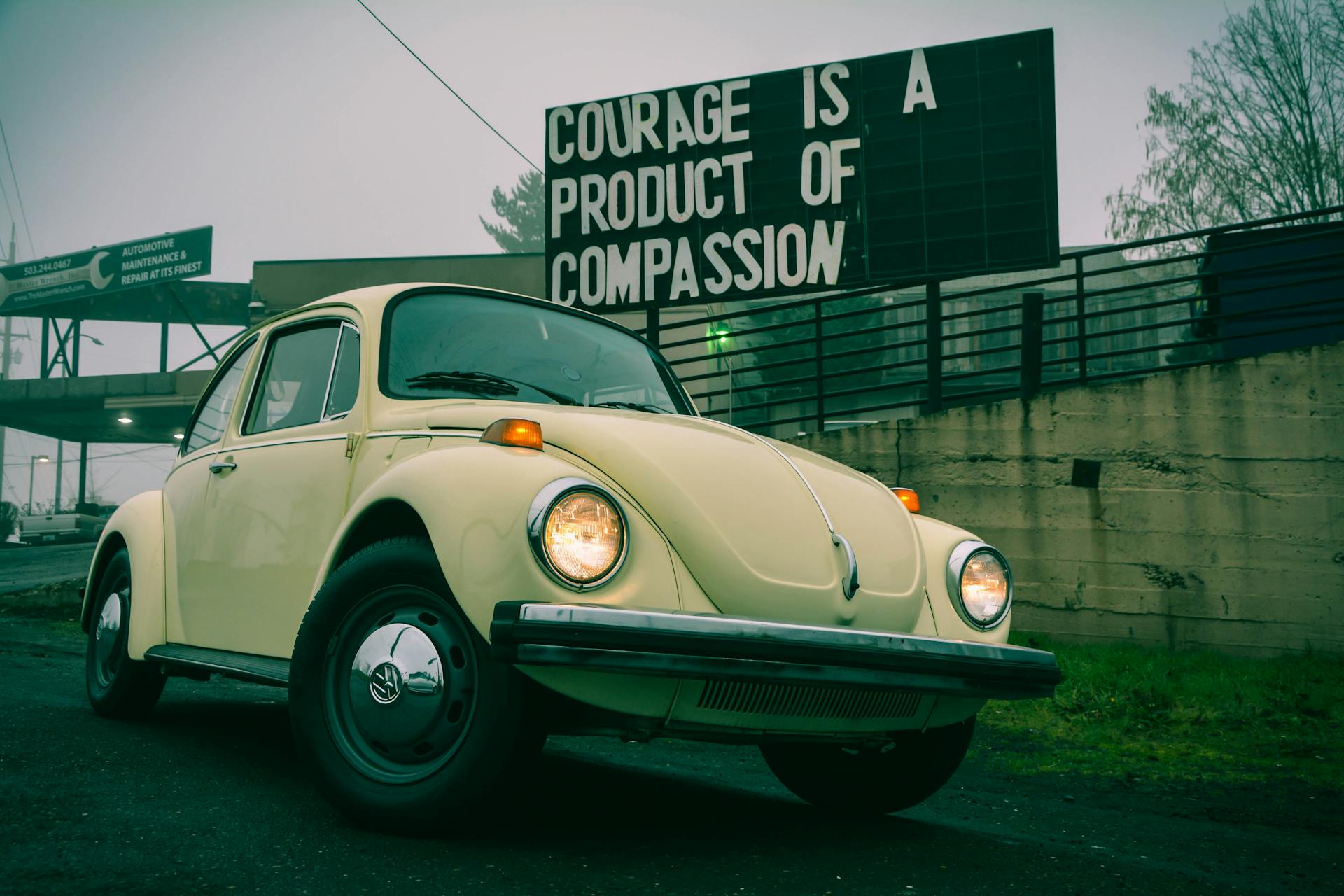
In Connecticut, commercial auto insurance is mandatory for businesses that use vehicles for work purposes. This includes companies with company cars, delivery trucks, and even ride-sharing services.
To register a vehicle in Connecticut, you'll need to provide proof of liability insurance with a minimum coverage of $25,000 per person, $50,000 per accident, and $25,000 for property damage.
Business owners can choose from various coverage options, including collision, comprehensive, and personal injury protection.
Check this out: Commercial Property Insurance Coverage Questions
What Is Commercial Auto Insurance?
Commercial auto insurance is a type of insurance that covers vehicles used for business purposes.
It's essential for business owners to have this type of insurance, as it helps protect their assets and finances in case of an accident.
Commercial auto insurance policies can be customized to fit the specific needs of a business, with options for different types of vehicles, coverage levels, and deductibles.
Businesses with multiple vehicles can save money by bundling their policies together.
In Connecticut, commercial auto insurance is mandatory for businesses that use vehicles for work.
See what others are reading: List of Insurances
Types of Coverage
Commercial auto insurance in Connecticut provides various types of coverage to protect your business and employees. Liability coverage is a must-have, but it only covers damages caused by your vehicle.
Commercial auto insurance helps cover injuries and damages resulting from work-related car accidents. Most states, including Connecticut, require commercial auto insurance for business-owned vehicles to help pay for medical expenses and property damage.
Some common types of coverage include medical payments (MedPay) coverage, which pays for medical expenses if employees and passengers are injured in a company-owned vehicle, regardless of who is at fault. This coverage is crucial in ensuring that your employees receive the medical attention they need.
Collision coverage helps pay for the cost of repairing or replacing your company vehicle if it's damaged in an accident, regardless of who was at fault. This coverage can be a lifesaver in case of an accident.
Here are some additional types of coverage you may want to consider:
- Uninsured/underinsured motorist coverage insures you against personal injuries and damage involving a company vehicle, in case whomever caused the accident is unable to cover the full cost of damages.
- Comprehensive coverage covers the costs of non-collision damages such as vandalism, theft, flood, or fire.
- Towing and labor coverage covers the cost of roadside assistance for company-owned vehicles.
- Loading and unloading coverage insures against the damage of equipment and materials during transport, loading, or unloading.
- Bobtail coverage is recommended when you're using tractors without a trailer. It usually covers the insured vehicle at all times, even during non-work-related uses.
By having the right types of coverage, you can ensure that your business and employees are protected in case of an accident or other unforeseen event.
Vehicle and Business
If you use your vehicle for work, you may need a business auto insurance policy. This is especially true if you deliver goods, provide a service that involves regularly using a vehicle, carry equipment for work, or go to job sites.
Business car insurance can provide more coverage than a personal auto policy, covering different risks when driving for business.
In Connecticut, all vehicles must have a minimum amount of auto liability insurance coverage, which includes $25,000 bodily injury liability per person, $50,000 bodily injury liability per accident, $25,000 property damage liability per accident, $25,000 uninsured/underinsured motorist coverage per person, and $50,000 uninsured/underinsured motorist coverage per accident.
You can check if your business needs additional liability coverage requirements by checking your USDOT number or docket number with the Federal Motor Carrier Safety Administration.
If this caught your attention, see: Health Insurance Asking about Accident or Injury
Vehicle Types
Commercial vehicles can be a variety of types, including cars, trucks, and vans. These vehicles are used for business or personal use by employees.
The types of commercial vehicles covered by insurance include cars, trucks (box, pickup & utility), and vans (cargo, work & box).
If you're a business owner in Connecticut, you'll need to consider the state's insurance requirements. These include a minimum of $25,000 bodily injury liability per person and $50,000 bodily injury liability per accident.
Some vehicles, like semi-trucks and tractor-trailers, require additional liability coverage. You can check if your business needs these requirements by looking up your USDOT number or docket number with the Federal Motor Carrier Safety Administration.
Here are some common types of commercial vehicles covered by insurance:
- Cars
- Trucks (box, pickup & utility)
- Vans (cargo, work & box)
Business Provides More Coverage
Having a business auto insurance policy provides more coverage than a personal auto policy, especially if you use your vehicle for work. If you deliver goods, provide a service that involves regularly using a vehicle, carry equipment for work, or go to job sites, you may need a business auto insurance policy.
You're exposed to different risks when driving for business than when driving for personal reasons. Even if you only have one car for all your transportation needs, you may need the more extensive coverage that's provided in a commercial auto policy.
A commercial auto policy can cover you and your employees up to the limits of the policy. This means that if you have employees who operate your cars, your commercial auto insurance policy can protect them in case of an accident.
If you're unsure whether your business needs a commercial auto insurance policy, it's worth getting a quote to assess your needs. Commercial auto liability insurance protects the assets of a company from claims, and it's typically insured under a commercial auto insurance policy.
Here are some common types of coverages included in a commercial auto insurance policy:
- Liability insurance to cover damages to other people or property
- Collision insurance to cover damages to your vehicle
- Comprehensive insurance to cover damages from non-collision events, such as theft or vandalism
- Uninsured or underinsured motorist coverage to cover expenses if the other driver is uninsured or underinsured
Frequently Asked Questions
What is the best insurance for commercial vehicles?
For commercial vehicles, Progressive is considered the best overall insurance option, but NEXT Insurance is a top choice for small businesses.
Is Geico good for commercial insurance?
GEICO offers competitive commercial auto insurance rates, flexible policy management, and dedicated specialists to help with policy changes. Consider GEICO for your commercial insurance needs if you're looking for reliable and personalized service.
Sources
- https://jmg.com/commercial-automobile-insurance/
- https://www.nextinsurance.com/commercial-auto-insurance/
- https://www.biberk.com/small-business-insurance/commercial-auto-insurance
- https://www.insureon.com/small-business-insurance/commercial-auto/connecticut
- https://www.petruzelo.com/tips-what-are-commercial-auto-insurance-requirements-connecticut.php
Featured Images: pexels.com


